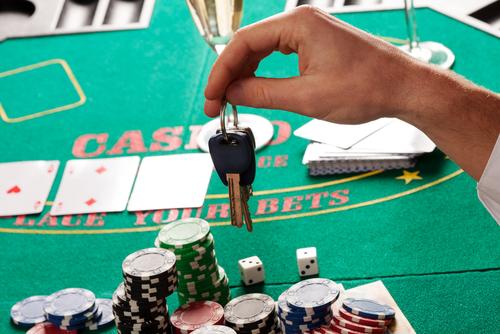Gambling Addicts' Brains Don't Have The Same Opioid Systems As Others

Tags: USA
Gambling Addicts' Brains Don't Have The Same Opioid Systems As Others published by Evanvinh
Writer Rating: 5.0000
Posted on 2016-03-26
Writer Description: Evanvinh
This writer has written 733 articles.
Oct 18, 2014 06:00 PM By Shweta Iyer
New research has found that gambling addiction may be linked to an altered opioid system in the brain, causing reduced feelings of euphoria. Photo courtesy of Shutterstock
All forms of addiction are due to biological alterations in the brain. These brain irregularities have often been seen in cocaine and heroin abusers, as well as alcoholics. Now, a new study suggests that the opioid systems in the brains of pathological gamblers may be different, affecting their control, motivation, emotion, and responses to pain and stress.
The study, which will be presented at the ECNP Congress in Berlin this weekend, found that opioid systems in people with gambling problems responded differently than it would in healthy volunteers. Such an effect caused a reduction in feelings of euphoria, thus explaining their addiction to gambling. In our brain's opioid system, peptides such as endorphins bind to opioid receptors, allowing cells to communicate.
For the current study, researchers used positron emission tomography (PET) scans to measure opioid receptor levels in the brains of 14 pathological gamblers and 15 healthy volunteers. There was no difference between the two groups. However, when they scanned their brains after giving each participant an amphetamine tablet, which causes a high known as an endorphin rush, they found that gamblers weren't able to release as many endorphins. After the participants answered a questionnaire, they also found that gamblers experienced a lower feeling of euphoria.
"From our work, we can say two things," lead researcher Dr. Inge Mick said in a statement. "Firstly, the brains of pathological gamblers respond differently to this stimulation than the brains of healthy volunteers. And secondly, it seems that pathological gamblers just don't get the same feeling of euphoria as do healthy volunteers. This may go some way to explaining why the gambling becomes an addiction."
Gambling is wildly popular in the U.S., where about two to three percent of the population report being addicted. Other studies have shown that the population as a whole spends up to $5 billion annually on gambling activities. What’s more, gambling addiction affects not just the person addicted but also their family — children of addicts are more vulnerable to suffering from mental disorders and domestic violence. A 2007 study from the UK, where the current study was based, found that about 0.6 percent of the total population had a gambling addiction.
"This is the first PET imaging study to look at the involvement of the opioid system in pathological gambling, which is a behavioural addiction," Mick said. The findings were surprising for Mick, who said that addicts, such as alcoholics, tend to have a higher level of opioid receptors. The findings suggest that the involvement of the opioid system in gamblin addiction "may differ from addiction to substances such as alcohol. We hope that in the long run this can help us to develop new approaches to treat pathological gambling"
Current interventions for gambling addiction include treatments with opioid antagonists, such as naltrexone and nalmefene, which have been shown to significantly reduce the severity of pathological gambling in those with a family history of alcohol dependence. The current discovery, however, presents an entirely different view on the processes that occur in gambling addicts' brains, and could open doors to new treatments.
Source: Mick I, et al. Endogenous opioid release in pathological gamblers after an oral amphetamine challenge. At The European College of Neuropsychopharmacology Congress. 2014.
Sources: http://www.medicaldaily.com/gambling-addicts-brains-dont-have-same-opioid-systems-others-307392
You have the right to stay anonymous in your comments, share at your own discretion.


